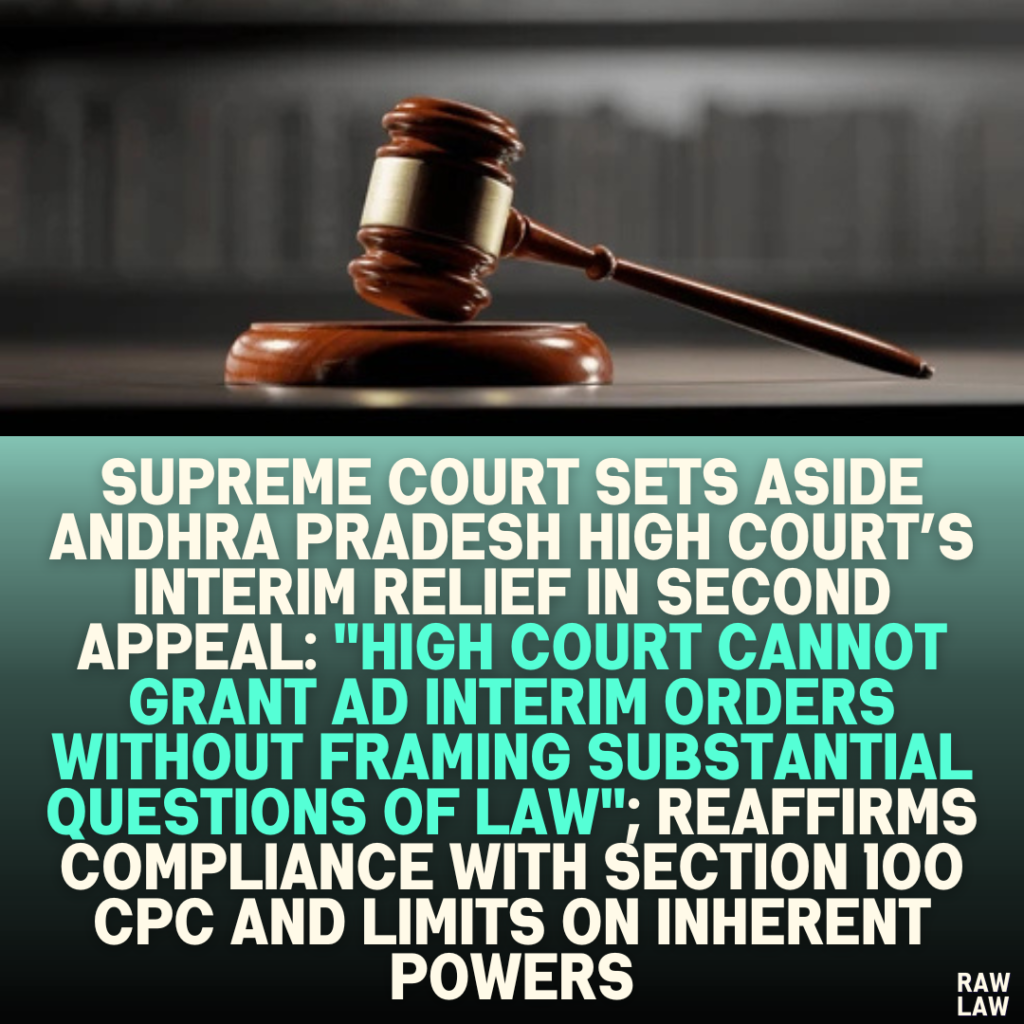1. Court’s Decision
The Supreme Court of India allowed the appeal and set aside the interim relief granted by the Andhra Pradesh High Court in a second appeal. The apex court ruled that the High Court’s order violated Section 100 of the Civil Procedure Code (CPC), which requires substantial questions of law to be framed before granting any relief in a second appeal. The Supreme Court clarified that the interim order, issued without meeting the procedural mandates, was unsustainable.
2. Facts of the Case
- Background: The case involved a property dispute concerning land purchased by a cooperative housing society in Tirupati, Andhra Pradesh. Over time, the society developed the land into plots and sold them to individual members, including the appellants.
- Plaintiff’s Claim: The plaintiff (respondent in the Supreme Court) claimed a share in one plot (Sy.No.10/1, measuring 0.61 acres). The plaintiff sought a permanent injunction, relying on mutation entries in the revenue records.
- Procedural History:
- The trial court ruled in favor of the plaintiff, granting the injunction.
- The first appellate court overturned this decision, holding that a suit for injunction alone was not maintainable without seeking a declaration of title.
- The plaintiff then filed a second appeal before the High Court, which granted interim relief, ordering both parties to maintain the status quo until further hearings.
3. Issues Raised
- Jurisdictional Issue: Can a High Court grant interim relief in a second appeal without first framing substantial questions of law, as required under Section 100 CPC?
- Procedural Issue: Does the non-service of notices to all respondents impact the validity of the interim order?
4. Petitioner’s Arguments
The appellants (defendants in the original suit) contended:
- Non-compliance with Section 100 CPC: The High Court acted beyond its jurisdiction by granting interim relief before framing substantial questions of law.
- Precedents: The appellants cited Ram Phal v. Banarasi, which holds that substantial questions of law are a prerequisite for exercising appellate jurisdiction in a second appeal.
- Revenue Records: The plaintiff’s claim of ownership based solely on mutation entries was invalid, as mutation does not establish ownership. The appellants relied on Bhimabai Mahadeo Kambekar v. Arthur Import & Export Co..
- Non-service of Notices: Not all respondents were served with notices, further undermining the procedural validity of the High Court’s interim order.
5. Respondent’s Arguments
The plaintiff (respondent in the Supreme Court) argued:
- Inherent Powers of the Court: The High Court has inherent jurisdiction under Section 151 CPC to pass interim orders in exceptional circumstances to preserve the subject matter of the dispute, even before framing substantial questions of law.
- Limited Scope of the Order: The interim relief was a temporary measure, merely preserving the status quo, and did not affect the rights of the parties or the merits of the case.
- No Violation of Law: The procedural requirements cited by the appellants were not strictly applicable in this case, as no final judgment was passed.
6. Analysis of the Law
- Section 100 CPC:
- This provision restricts the High Court’s jurisdiction in second appeals to cases involving substantial questions of law.
- The court is required to:
- Satisfy itself that a substantial question of law exists.
- Formulate the question before granting relief.
- Precedents Reiterated:
- Ram Phal v. Banarasi: Interim relief in second appeals cannot precede the framing of substantial questions of law.
- Raghavendra Swamy Mutt v. Uttaradi Mutt: The jurisdiction to grant interim relief is contingent upon compliance with Section 100 CPC.
- Bhimabai Mahadeo Kambekar: Mutation records cannot confer ownership or title.
- Inherent Powers vs. Express Provisions:
- Section 151 CPC gives courts inherent powers to pass orders in the interest of justice. However, these powers cannot override explicit procedural mandates.
- The Supreme Court quoted Manohar Lal Chopra v. Rai Bahadur Rao Raja Seth Hiralal, emphasizing that inherent powers cannot nullify express provisions of the law.
7. Precedent Analysis
The judgment drew on several Supreme Court decisions, such as:
- Ram Phal v. Banarasi: High Courts must frame substantial questions of law before granting relief in second appeals.
- Raghavendra Swamy Mutt v. Uttaradi Mutt: The appellate jurisdiction under Section 100 CPC is strictly limited to cases involving substantial questions of law.
- Santosh Hazari v. Purushottam Tiwari: Reinforced that the existence of substantial questions of law is a prerequisite for hearing second appeals.
- Bhimabai Mahadeo Kambekar: Clarified that mutation entries do not establish title.
8. Court’s Reasoning
- Violation of Section 100 CPC:
- The High Court acted contrary to Section 100 CPC by granting interim relief before formulating substantial questions of law.
- Non-Service of Notices:
- The interim relief was also procedurally flawed as not all respondents had been served with notices.
- Inherent Powers Misused:
- The High Court’s reliance on inherent powers under Section 151 CPC was inappropriate, as express provisions governed the issue.
9. Conclusion
The Supreme Court set aside the High Court’s interim order, reiterating that:
- The procedural requirements under Section 100 CPC are mandatory.
- The High Court’s failure to frame substantial questions of law rendered its order invalid.
10. Implications
This judgment reinforces:
- The procedural safeguards in appellate jurisdiction under Section 100 CPC.
- The limited scope of inherent powers under Section 151 CPC.
- The necessity of adhering to procedural mandates to ensure judicial discipline and fairness in second appeals.
